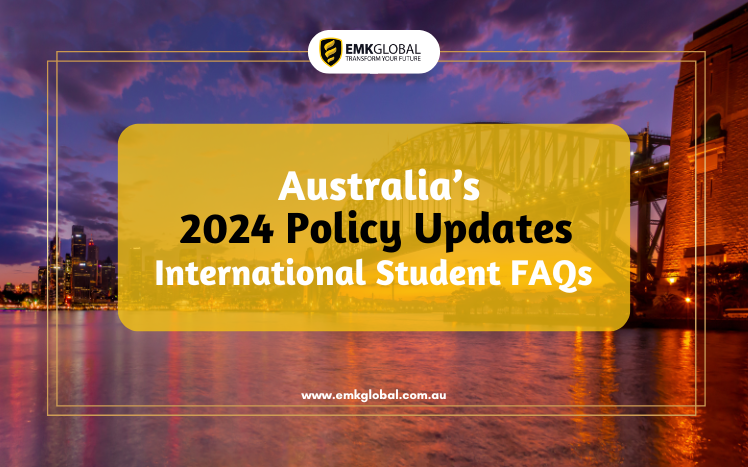As Australia updates its policies for 2024, international students are seeing changes from visa requirements to accepted English-language tests. With the introduction of a soft cap on international student numbers, the landscape is evolving. Here’s what you need to know about these updates.
Note: This article is for informational purposes only and subject to change. For official guidance on Australian student visas, visit Study Australia or the Department of Home Affairs’ Student Visa page.
Changes to International Student Intake
What is the New Soft Cap on International Students?
The Australian government is introducing a soft cap on the number of international students that colleges and universities can accept. Institutions can negotiate for more students if they provide international and domestic student housing. This is in contrast to Canada’s temporary hard cap, which is set at a national level and is less flexible.
Key Points of the Student Cap
- Higher Degree by Research Exemptions: Students in higher degree by research courses, such as master’s degrees by research or PhDs, are exempt from the cap.
- Regional and In-Demand Courses: There are discussions about exempting students in regional Australia and those taking in-demand courses.
- Quality Track Record: New education providers must demonstrate a history of quality education delivery to domestic students before recruiting international students.
- Regulatory Oversight: Providers under investigation cannot enroll new international students, and education agents will not receive commissions for student transfers between institutions.
- Ownership Restrictions: Education providers cannot own education agent businesses, and stricter guidelines on the ownership and registration of education agents and providers are forthcoming.
Implementation Timeline
The cap on incoming international students is expected to begin in early 2025.
Affected Student Groups
The cap will primarily affect international students enrolling in undergraduate or postgraduate coursework courses. Higher degrees by research students are exempt, and the status of primary or secondary school students remains unclear.
Understanding Higher Degree by Research Courses
These courses involve advanced skills, techniques, and knowledge in research. They are typically at Level 10 in the Australian Quality Framework (doctoral degree), but also include some Level 9 master’s degrees by research.
English Language Proficiency Requirements
Updated Proficiency Levels
The Australian government has increased the minimum English-language proficiency levels for incoming students:
- Student Visas: Increased from IELTS 5.5 to 6.0 (or equivalent).
- Packaged ELICOS Courses: Increased from IELTS 4.5 to 5.0 (or equivalent).
- University Foundation Programs: Remains at IELTS 5.5 (or equivalent).
For the Temporary Graduate work visa, the minimum score has increased from IELTS 6.0 to 6.5 (or equivalent).
Using TOEFL Test Results
The updated TOEFL iBT test is now accepted for visas if taken on or after May 5, 2024. Tests must be taken in person at a test center. Results from tests taken online are not accepted.
Validity of Existing TOEFL iBT Results
- Before July 25, 2023: Valid for two years for visa purposes.
- Between July 26, 2023, and May 4, 2024: Not accepted for visa purposes, but can be used for study course applications.
Financial Proof for Student Visa Applications
Required Financial Capacity
From May 10, 2024, students must show access to A$29,710 to cover living expenses for one year. Additional funds are required for partners (A$10,394) and children (A$4,449). Costs vary by region, especially in cities like Sydney and Melbourne.
Travel Costs
- East or Southern Africa: A$2,500
- West Africa: A$3,000
- Elsewhere Outside Australia: A$2,000
- Within Australia: A$1,000 (A$1,500 if returning to Africa)
Changes to the Student Visa Application Process
Genuine Student Requirement (GS)
On March 23, 2024, the Genuine Temporary Entrant requirement was replaced by the Genuine Student requirement. The new process includes a list of targeted questions requiring evidence-based answers.
What is the Genuine Student Requirement?
The GS requirement includes questions on:
- Family and community ties
- Work and academic history
- How the course will help the student
- Understanding of course requirements and living in Australia
- Reasons for choosing the specific course and institution
Supporting documents, such as transcripts and employment history, are recommended. The GS requirement aims to select students primarily focused on studying in Australia, while also considering those in high-demand fields who may seek permanent residence later.
For more details and updates, refer to official Australian government resources.


